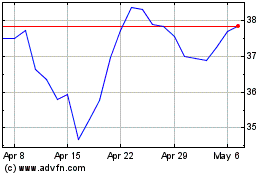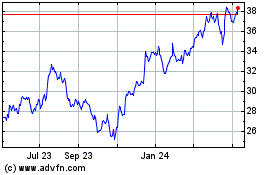Bills Aimed at Curbing SEC Face Veto Threat
September 07 2016 - 9:10PM
Dow Jones News
The Obama administration threatened to veto two bills that would
scale back the Securities and Exchange Commission's oversight of
fundraising by small companies and its regulation of private-equity
managers.
The House is scheduled to vote Thursday or Friday on the
legislation, which reflects Republicans' desire to further
deregulate stock offerings by startups and small businesses.
The veto threat, issued Tuesday, shows the White House opposes
further loosening regulation in this sector. It supported relaxing
some fundraising rules when it backed the 2012 Jumpstart Our
Business Startups Act.
One piece of the Republican legislation, authored by Rep. Tom
Emmer (R., Minn.), would allow small companies to raise up to
$500,000 without distributing financial statements and other
information that typically accompanies a public stock offering. The
exemption would be available for deals in which the buyers of
shares and the company issuing them know one another, and when
there are 35 or fewer purchasers of the shares.
The White House, in its veto threat, said the bill would allow
companies to sell risky securities "without appropriate regulatory
protections."
A related provision sponsored by Rep. Ann Wagner (R., Mo.) would
remove some red tape for small companies, including those traded in
over-the-counter markets where investors typically get less
information about the businesses. Under the legislation, the
businesses could sell stock to the public on an accelerated
timetable with less oversight by regulators. The special status has
in the past been restricted to companies that have issued common
stock valued at $75 million or more, but the legislation would
repeal that restriction.
A second bill, sponsored by Rep. Robert Hurt (R., Va.), would
ease some rules for private-equity managers, which raise money from
pension funds, insurance companies and wealthy individuals to
purchase companies they hope to sell later for a higher price.
In particular, the bill would exempt private-equity firms from
having to provide regulators with information about the debt levels
of their portfolio companies and the countries where the
investments were made. The legislation also would make it easier
for private-equity firms to advertise their successful deals to the
financial institutions and wealthy individuals who invest in their
funds.
The American Investment Council, whose members include
private-equity firms such as Apollo Global Management LLC and
Blackstone Group LP, said it supports the bill.
Separately, the House voted 241-174 on Wednesday to approve a
bill opposed by the White House that would bar the Justice
Department from requiring defendants who settle cases to make
donations to outside groups. Republicans have said such deals
foster a government "slush fund."
The legislation was a response to multibillion-dollar
settlements with Citigroup Inc., Bank of America Corp. and others
to resolve claims that they misled investors about quality of
mortgage-backed securities that lost much of their value by 2008.
The Justice Department settlements allowed the banks to get credit
toward the penalties by donating to housing groups and others
approved by federal regulators.
Under its 2014 deal, for example, Bank of America was required
to donate $50 million to community development funds certified by
the Treasury Department, $30 million to state accounts that help
low-income people with legal problems, and $20 million to housing
counseling groups that are approved by the Department of Housing
and Urban Development.
Write to Dave Michaels at dave.michaels@wsj.com
(END) Dow Jones Newswires
September 07, 2016 20:55 ET (00:55 GMT)
Copyright (c) 2016 Dow Jones & Company, Inc.
Bank of America (NYSE:BAC)
Historical Stock Chart
From Mar 2024 to Apr 2024

Bank of America (NYSE:BAC)
Historical Stock Chart
From Apr 2023 to Apr 2024
